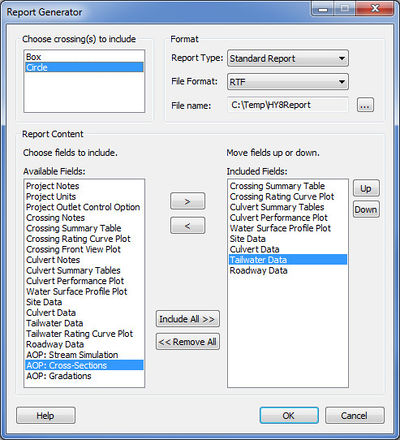HY8:Report Generation: Difference between revisions
| Line 11: | Line 11: | ||
This section is divided into available fields and included fields. The available fields section comprises a list of all possible report topics the user can include in the report. Topics found in the included fields section are what will be displayed in the final report. These fields will appear in the report in the same order they appear here, but they may be moved up or down in the list by selecting the desired topic and clicking on the button describing the direction the user wants the topic to move. To add or remove topics, the user selects the appropriate topic and clicks the right or left arrow button, depending on the desired result. | This section is divided into available fields and included fields. The available fields section comprises a list of all possible report topics the user can include in the report. Topics found in the included fields section are what will be displayed in the final report. These fields will appear in the report in the same order they appear here, but they may be moved up or down in the list by selecting the desired topic and clicking on the button describing the direction the user wants the topic to move. To add or remove topics, the user selects the appropriate topic and clicks the right or left arrow button, depending on the desired result. | ||
[[Image:HY8image ReportGenerator.jpg|thumb|none|400 px]] | [[Image:HY8image ReportGenerator.jpg|thumb|none|400 px|Example of the ''Report Generator'' dialog]] | ||
Revision as of 15:01, 4 May 2015
Report Generation
Once a culvert project is completed and analyzed, there is the option of creating a report. A report can be created for just one or multiple crossings. The user can also select from the available fields which data to include and reporting what order. The report file type is a rich text file (*.rtf) which can be opened in Microsoft Word for editing. The report generation window is divided into the following sections:
Choose Crossing(s) to Include:
All crossings in the project appear here. The user may select a single, multiple, or all of the crossings to include in the report.
Format:
Three report types are available. The user may select the default standard report, which includes the results in the figure below. The second report type is Summary, which includes the crossing and culvert summary tables along with the site, tailwater, roadway, and culvert data. Custom is the final report type in which the user designates which topics to include in the report.
Report Content:
This section is divided into available fields and included fields. The available fields section comprises a list of all possible report topics the user can include in the report. Topics found in the included fields section are what will be displayed in the final report. These fields will appear in the report in the same order they appear here, but they may be moved up or down in the list by selecting the desired topic and clicking on the button describing the direction the user wants the topic to move. To add or remove topics, the user selects the appropriate topic and clicks the right or left arrow button, depending on the desired result.
